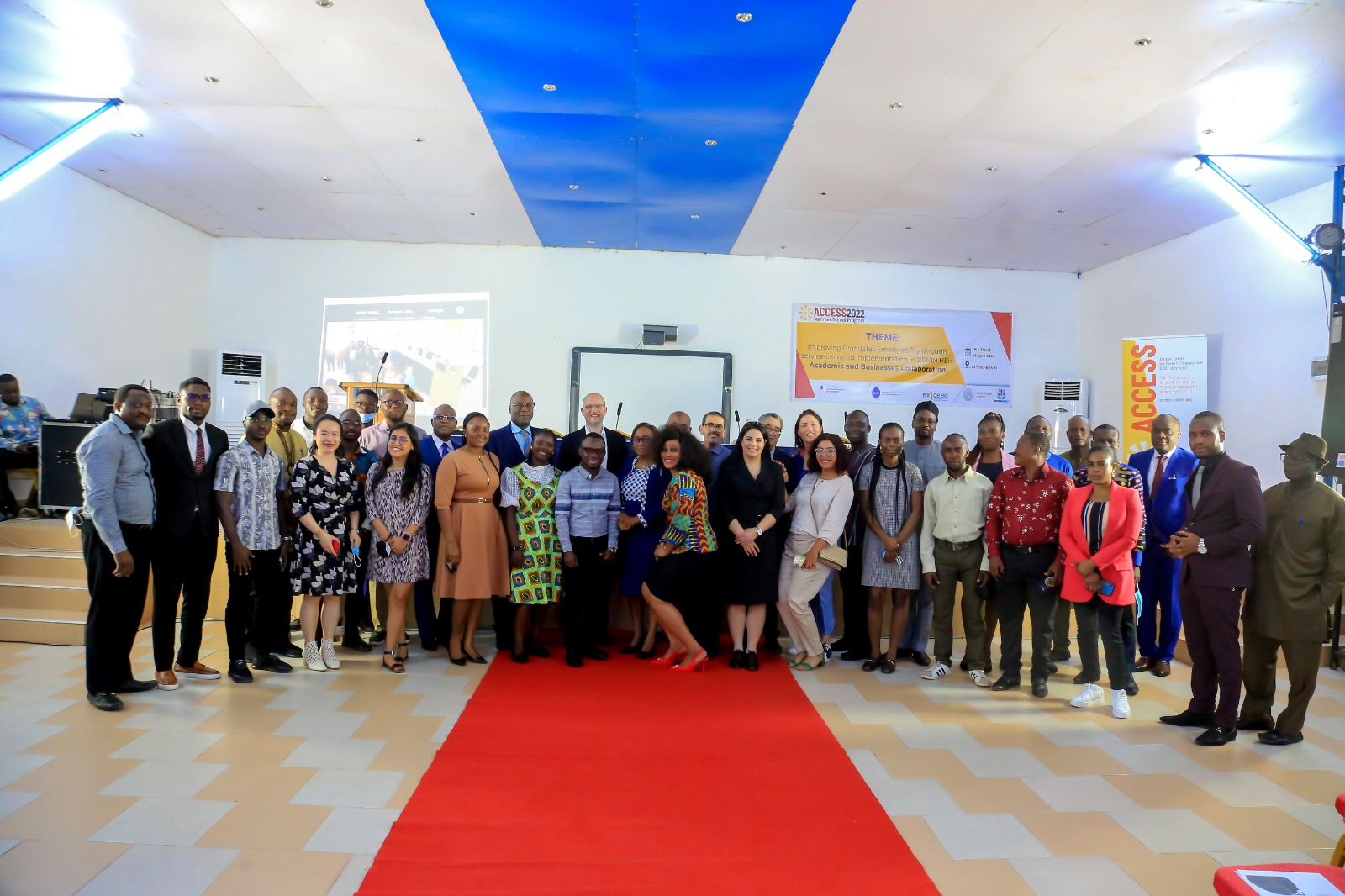ACCESS International Summer School Benin 2022
Title: "Improving Graduate Employability through Service-Learning Implementation in African HEIs: Academic and Business Collaboration"
Date: 28th March - 1st April 2022
Venue: IRGIB Africa University, Cotonou, Benin
Summary
The 1st ACCESS International Summer School was organised by IRGIB Africa University in Cotonou, Benin. The 5-day event, which began on 28 March 2022 and ended on 1 April 2022, operated under the theme “Improving Graduate Employability through Service-Learning Implementation in African HEIs: Academic and Business Collaboration.” Over 50 in-person and virtual participants took part in the event, including representatives of the seven partner universities of the project—board members, project coordinators, lecturers, and PhD students.

The opening ceremony was held at the IRGIB African University auditorium, featuring guest speakers from the public and private sectors, the education ministry in Benin, various universities, the German Embassy in Benin, students, and other key stakeholders interested in service learning (SL) at HEIs. Notable dignitaries and speakers included Prof. Virgile Ahyi (President, IRGIB African University), Prof. Zacharie Vissiennon (Vice President, IRGIB Africa University), Prof. Dr. Utz Dornberger (Director, SEPT Competence Center, Leipzig University and Project Lead for ACCESS), Senator Albert Feliho (President, Entrepreneurs Association in Benin), Mr. Karim Youssao Abdou (Representative of the Ministry of Higher Education, Benin), and Madam Laetitia Dagnonhoueton (Representative of the German Embassy in Benin). The keynote addresses emphasised the necessity for reform in Africa’s educational sector to enhance knowledge transfer efficiency while prioritising and intensifying interventions in vocational and practice-oriented training at higher educational institutions (HEIs). This approach aims to increase graduates’ entrepreneurial capabilities, skills, and competencies to reduce the rate of graduate unemployment in the African sub-region. The importance of incorporating SL into HEI curriculums and teaching modules was a major highlight.
The summer school focused on SL as a crucial strategy to develop graduates’ entrepreneurial and intrapreneurial skills, addressing the unemployment issue in Africa. The programme included a mix of presentations from academia and the private sector, providing diverse perspectives on employability skills and service learning in African HEIs. Participants engaged in intensive group work and interactions, designing SL initiatives tailored for their respective universities. Topics covered included SL strategy implementation, course planning and design, using modern digital tools, collaborations for successful SL, and sustaining SL programmes in HEIs.
One of the main takeaways was the evolving role of lecturers. They are encouraged to transition from being mere content providers to facilitators who promote critical thinking, creativity, and professional skills. This requires keeping up with market needs and integrating technology into teaching methods. Universities have a responsibility to foster knowledge exchange, develop skill-oriented policies, and collaborate with industry for internships and research opportunities. Supporting student innovation through incubation centres is also crucial.
Students, on their part, should be proactive in learning new skills, seeking opportunities, and innovating for self-employment. Adapting to global work environments and applying intrapreneurship skills are essential for their future careers. Governments should invest in skilling graduates, partner with universities and industries, and introduce policies emphasising STEM education. The National Service Scheme should provide hands-on training and match graduates with industry needs, fostering civic duty and problem-solving skills.
Improved collaboration between universities and industry is essential. Industry should actively participate in curriculum development, offer internships, and engage with students and alumni. Companies must invest in training without expecting immediate returns for long-term benefits. However, gaps were identified, such as the lack of soft skills among graduates and the need for more practical, industry-relevant teaching methods. Recommendations included genuine collaboration among stakeholders to enhance employability skills, regular curriculum reviews by universities, building relationships with employers, and creating practical learning environments. Investment in staff capacity, interdisciplinary studies, faculty internships, and global exchange programmes is crucial. Soft skills should be a core part of the curriculum, with assessment methods that include these skills.
The ACCESS International Summer School 2022 in Benin was funded by the DAAD (German Academic Exchange Service) under the EXCEED Initiative with financial support from the Federal Ministry of Economic Cooperation and Development (BMZ).
Conference Documents
- N.N.